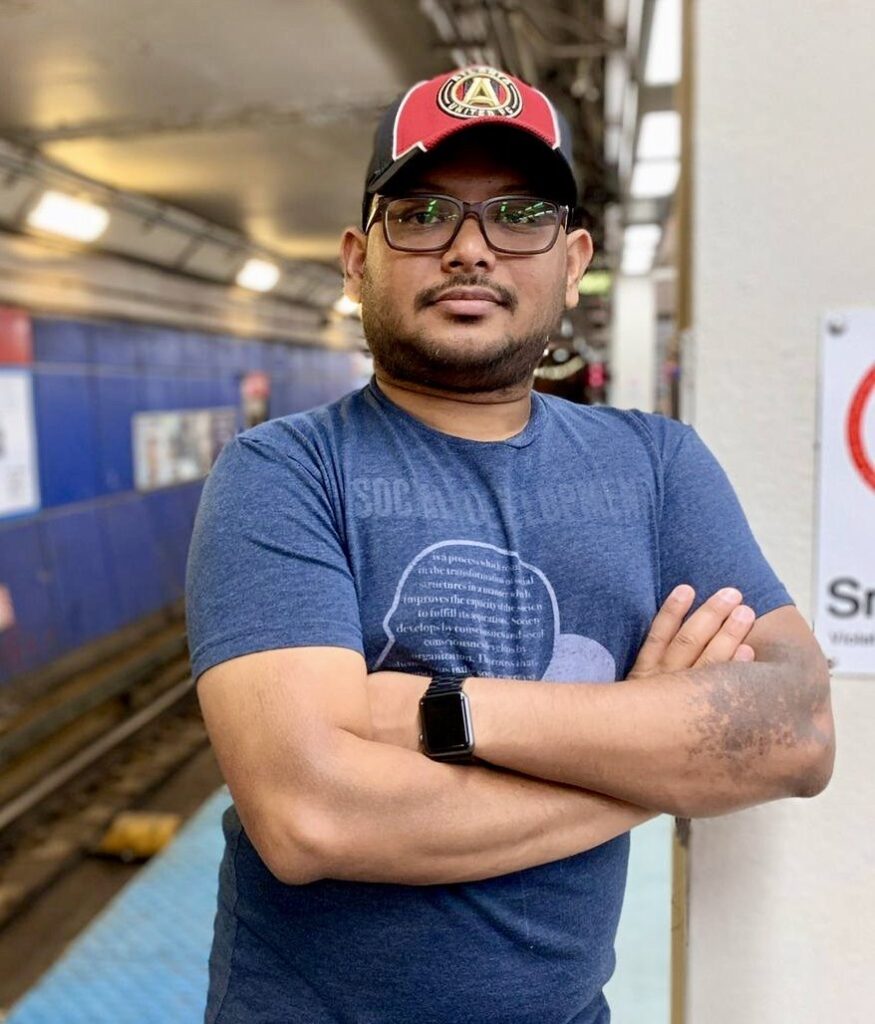It can be tough and exhausting to work in an environment that doesn’t give you meaning. And if it’s a unhealthy workplace it makes it miserable, and if it’s a healthy work environment, it some how makes it feel worse.
It’s easy to lose motivation and meaning in a job where it’s toxic, there’s no reason to attach meaning to it. You are their for survival – and you’re actively trying to leave the workplace for better opportunity. Feeling stuck in those situations can drain all of our motivation and energy, and you need to conserve the energy for your next chapter.
When you have a “good job” but it’s mundane – you log off at the end of the day, you feel a nagging sense of emptiness. You’re doing the work, but you can’t shake the feeling that none of it really matters. You might even be wearing golden handcuffs – great benefits that make it nearly impossible to leave – in your role.
Sadly, the feeling of emptiness and purposelessness is incredible common and one of the key indicators of burnout.
Too often our work become our primary identity, “I’m a leadership coach” or “I’m an analyst” etc. This is a problem all to itself, which we’ll discuss in another article. Society doesn’t make it easy either – we’re often told to “follow our passion,” and pay bills and contribute to the community and take responsibilities, and . . . the list continues.
It took me time to learn this valuable lesson, your purpose isn’t a job. It’s a perspective.
Tying our purpose to a title is harmful from the start – when we don’t get that title, we feel like a failure and we start having purpose crisis: “I don’t know what I’m doing with my life.” That in itself is another challenge, but we need to learn how to separate purpose from our job/title, and use purpose as our perspective in life.
Purpose is like the compass that tell you which way is your truth (north). We are encouraged to go through North, East, South, and West to continue on our journey. And that’s okay, and more realistically. Like a GPS for our life – you know your destination, and you’ll have make several turns to get to your destination. And that’s okay – that’s life.
If we’re lucky and find our purpose early in life, we can aim towards finding a career that aligns with our purpose. Most of us figure out our purpose as we live and experience life and it’s important to build space/time for purpose within our job. Finding purpose in your work is about having the ability to connect what you do every day, no matter how small or mundane it seems, to something bigger than yourself.
For example, I started my career in Fortune 500 company and while working as a financial analyst, I didn’t see it’s connection to helping people directly. I was feeling exhausted because the work didn’t align with my purpose – helping people – so I started mentoring my colleagues, leading teams, and started developing opportunities to coach people. It was rewarding and it had a strong alignment to my purpose. To this day, I make sure my work (job) doesn’t conflict with my purpose/passion – coaching.
You can create the same – because purpose is the ultimate intrinsic motivator.
It’s the fuel that keeps you going when a project gets tough, the reason you take pride for your work, and the cure for that Sunday evening dread.
And the best part is, you don’t have to quit your job to find it. You can start cultivating it right where you are, today.

Find the human impact
As a financial analyst, my 50 hour work week would be 90% screen time and 10% meetings. This was exhausting because I couldn’t tie it back to the people I was serving (not the company, but client). I got lost in spreadsheets, emails, and processes and forget those tasks helped people.
The simplest way to find purpose is to zoom in on the human impact of your work.
Consider these questions:
- Who are you helping?
- What impact are you having on a person’s life?
- Why is this impact important for the person you’re supporting?
- How can you see more of the impact on the person you’re helping?
- Where are the gaps in supporting that one person?
This might be tough you’re working on internal process – accounting, HR, operations, etc. but speaking with your colleagues can help you learn how the work in accounting is actually helping people internally, and how it expands to the greater team and organization.
If you’re in a toxic workplace, that can be exhausting – so, I encourage you to focus on questions that take you outside of your workplace, and into your community of friends, family, and the greater community. That can look like supporting your neighbor, volunteering, or even starting a business.
This week, make it your mission to find one story of how your work helped someone. Ask a colleague, look through customer feedback, or just take a moment to think through the chain of events your work sets off. Write that story down. Make the “who” real, and your work will instantly feel more meaningful.

Strive towards mastery
There will be times, where the impact to a person is so complex, that it leaves you with more questions and exhaustion than insights.
Sometimes, purpose isn’t found in the outcome, but in the work itself.
Think of a master carpenter who takes immense pride in a perfectly joined corner, or a chef who finds joy in a beautifully plated dish. You can bring this same “craftsman” mindset to any role. This is about shifting your focus from just completing the work to excelling at it.
It’s about taking pride in your personal skill, attention to detail, and continuous improvement. When you view your work as a craft, even routine tasks become opportunities to build your mastery. NOTE: this isn’t about reaching for perfection, which has a negative connotation, but mastery where you’re appreciating the journey of getting closer to perfection and the emphasis is on the process of learning and developing your skills.
For me, I loved helping people so much that I left my Fortune 500 company to develop my research and development skills in Neurology, and than Counseling because I wanted to get better at my skills of helping people. This led me to fulfill more of my purpose – helping people.
Identify Your “Signature Skill.” What is one skill you want to develop and master? Maybe it’s writing incredibly clear emails, creating flawless spreadsheets, or being the most organized person on the team. It can even be outside of the work setting, maybe you want to learn how to write a novel, photography, etc. Find opportunities within your job for you to extend your interest and service to help your team and organization. Pick one thing and dedicate a little extra effort to honing it this week. The pride you take in your own skill is a powerful form of purpose.

Own your slice
When I was about 7 years old, I was curious about how a watch could keep time – it was always working correctly. Even when I wasn’t looking at it – how was this possible? So, i did what every curious 7-year-old would do. I borrowed my dad’s watch and opened it. Well, I struggled to open it nicely by a brick and a watch – brick won. When I opened it up, all saw were parts, big and small. So many parts. I still didn’t know how the time was kept, but it was interesting to learn that a tiny watch could have so many parts, big and small.
Long story short, my dad found out I broke his favorite watch – I learned how all the gears work together to make the whole system work and even a grain of sand could make the whole watch from functioning. He told me, what you do matters, even a grain of sand can have a significant impact.
It’s easy to feel like a small, when we are far from seeing our impact, and especially in a large organization. But, just like the grain of sand, without you doing your part the organization wouldn’t be as efficient as it it. Your “slice” of the work matters – you matter.
As you focus on your work, start owning your slice of the process – finding purpose here is about zooming out and understanding how your specific responsibilities connect to your team’s goals, and how your team’s goals connect to the company’s mission. This isn’t about skills, or people, it’s about seeing the connection – the invisible impact that connect everything together.
Again, if you’re in a toxic space it can help to see how far the connection or toxicity goes – where you can find safe haven, where you’ll end up in trap hope, etc. Finding purpose in toxic workplace is about how you can find supporters and advocates to help you manage your time/energy, provide protection, and help you feel stable enough to make moves to leave the space or hold people accountable for their toxicity.
Next week, Ask your manager or a senior colleague, “I want to get better at my role, and can you help me understand how my work on X directly impacts the team’s goal of Y?” or “What would happen if my part of the process didn’t get done well?” Understanding the chain of dependency shows you that your contribution is a critical link, not just an isolated task.

Give more than you get
People know my passion and purpose of helping people, and at my corporate roles I’m regularly asked to give myself to the company/organization. And I love it! I get to share more about myself with my colleagues and it strengths my determination to support my organization.
We often frame jobs as a transactional relationship, I give you hours and skills, you give me a salary, benefits, a title.
Sadly, transactional relationships are rarely fulfilling, and it can exacerbate feelings of exhaustion. Giving more than we get is a way to support your colleagues, community and organization while living and modeling your purpose. Find opportunities to volunteering opportunities so you’re not stuck doing the same mundane activities continuously – escaping from your immediate team for a few hours a week can have a lasting impact on your mental health and help you find purpose in your work.
Additionally, try reframing how you talk about work:
“I do this job to get a paycheck” becomes “I do this job to give my family a life of security and opportunity.”
“I do this job to get experience” becomes “I do this job to give my future self more skills and options.”
“I do this job to get a promotion” becomes “I do this job to give myself a platform to have a bigger impact.”
This reframing connects your daily effort to your deepest personal values, turning your job into an act of service to the people and goals you care about most. This is helpful when you’re in a toxic workplace – you are there still because you’re still giving your higher priorities a chance at a better life. BUT, that shouldn’t keep you at a toxic environment, that can be used to dull the pain of returning to your toxic work environment while you discuss what and how you’ll improve your situation.
Starting today, start reframing what you get and give from your role, and seek opportunities to give more of yourself – within YOUR boundaries.
You don't have to find purpose alone
Uncovering your sense of purpose is a deeply personal journey. It requires self-reflection, curiosity, and a willingness to see your work through a new lens. It can be hard to do this work when you’re feeling stuck, burnt out, or disconnected.
This is where a coach can be an incredible ally. A coach doesn’t give you the answers; they help you find your own. Think of a coach as your GPS with higher functions that allow you to find shortcuts, barriers, and make the journey to getting to your destination easier and faster.
Together, we can:
Explore your core values and what truly matters to you.
Uncover the hidden meaning and impact in your current role.
Brainstorm ways to proactively shape your job to be more purposeful.
Create a career path that is not just successful, but deeply fulfilling.
If you’re ready to move beyond just “doing the work” and start building a career that feels meaningful, let’s connect. Book a free, no-strings-attached call today to explore how you can find your purpose, right where you are.

